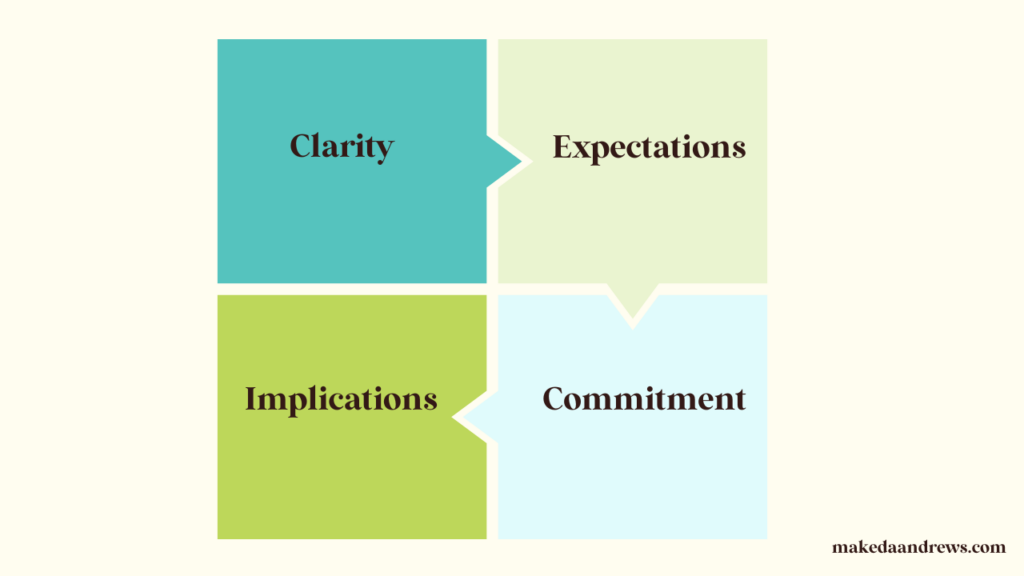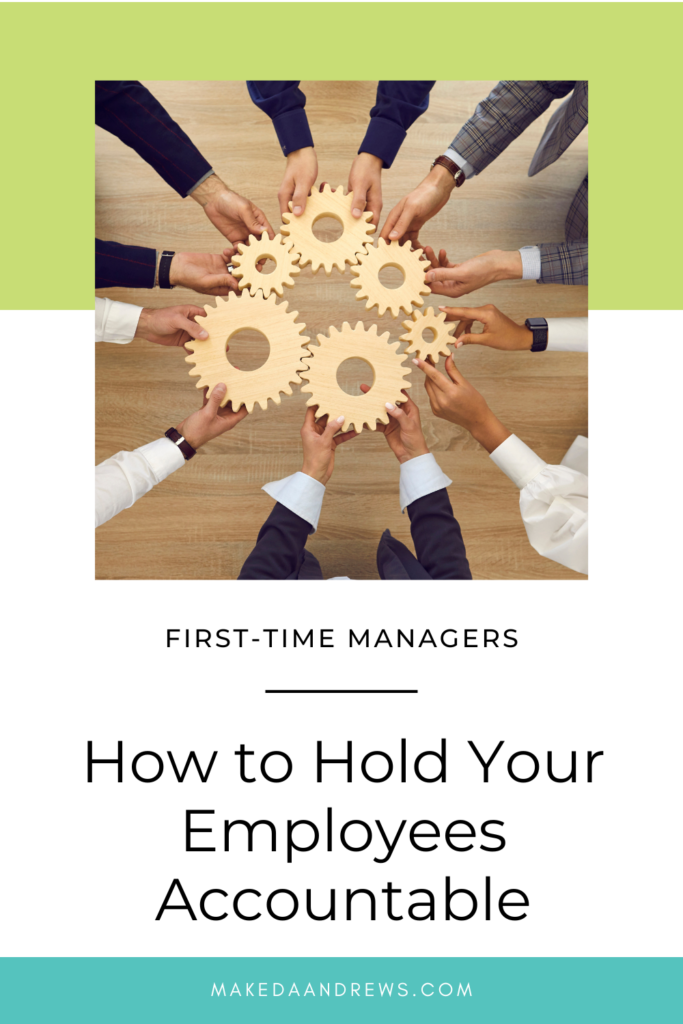HOW TO HOLD EMPLOYEES ACCOUNTABLE
Hi, I'm Mak. I'm a leadership coach for new managers who knows what it's like to be filled with overwhelm, self-doubt and terror that I’d let everyone down. My Story
FREE MICROCAST
How to Become an Effective Leader so You Can Build a High Performance Team
Learn how to delegate with confidence, navigate those tricky conversations (even for introverts!), and finally stop relying on Google to do your job.
Netflix < MakTV
THE YOUTUBE CHANNEL
No but really. This is the kinda content that’s actually healthy to binge. In fact, you become more of an awesomesauce manager with every video you watch.
Updated October 14th, 2024
One of the first skills that you need to master as a first-time manager is learning how to hold your employees accountable. It will help you ensure that every team member knows and takes responsibility for their actions. Despite being one of the most important, most new managers don’t know where to start or what steps to take to set clear expectations and provide the right path for your team to accomplish them. If you’re in this pickle, keep reading, as I’m about to show you how you can master this skill with the help of a four-essential puzzle.
Before diving into the content, make sure to grab a seat and sign up for my FREE class, How to Become an Effective Leader so You Can Build a High-Performance Team, here!

Let’s Start with the Basics: What is Accountability, and What Does it Mean to Hold Employees Accountable?
Just so we’re on the same page, let’s start by defining what we mean by accountability. To do so, I’m going to use a famous quote from the leadership world:
“Accountability is the glue that ties commitments to results.”
As a new manager, your focus should be on emphasizing accountability to help you build trust, lead your team to success, and address any challenges that may come your way.
Here’s the thing: Leaders who hold themselves and their teams accountable promote higher performance and clear expectations and cultivate integrity.
With all this being said, there’s only one way to start taking baby steps toward developing your team’s accountability. I like to call this method the four-piece puzzle for accountability:
- Clarity
- Expectations
- Implications
- Commitment
Let’s dive deeper into each one.

1. Clarity.
There’s a reason why this is the first piece of our puzzle. Think of it like you’re going to a new place without a GPS to guide you. You probably won’t make it that far. In a similar way, your team needs clarity from you so they are responsible and committed to their actions.
Make sure to give them clarity in the following aspects:
- Where you are. As a leader, you need to be transparent about the goals and responsibilities assigned to you and your team. Providing a clear picture will encourage your team, get them excited about playing their part to achieve those goals. What’s most important, will keep them focused on results. It’s a huge opportunity for motivating your team you don’t want to miss!
- Where you are going. One of the best traits of a leader is knowing they need to evolve constantly. So, as a new manager, challenge yourself to achieve new goals and results. At the same time, communicate your new adventures to your team. It will empower them to set professional and personal goals for themselves.
- Why are you heading in that direction. Knowing the ultimate goal of your position and your team’s will help you navigate safely in uncharted territories. Besides, it will give you the confidence to move forward and achieve bigger results.
If you need more tips, check out this video, where I talk about driving results through accountability. We’ll explore each one of these elements.
Clarity.
I’m always preaching to my Accelerator students about clarity because you will be ineffective at what you do in more ways than one if you don’t have it. Now the trick is to ensure you have gained clarity on the essential components of your role and department.
To sum it up, you must be clear in the following:
- Where you are, refers to the expectations and responsibilities assigned to you and your team. Knowing your current situation will help you set clear goals for the rest of the team members.
- Where you are going, if you want to grow, you need to keep moving constantly. This means you don’t want to run before learning how to walk. That’s why you should challenge yourself to achieve new goals and destinations.
- Why do you head in that direction. Knowing the ultimate goal of your position and your team’s will help you navigate safely in uncharted territories and provide you with the confidence needed to move forward and achieve bigger results.
Clarity is like having a GPS to guide you in the right direction. Adding this component to your management will help you hold employees accountable and provide bigger and better results.
2. Expectations.
The second piece in our puzzle to hold employees accountable is providing clear expectations – see what I did there? I joined the first and second pieces. Yep, there’s a logical order you need to follow.
Clear expectations refer to the need to articulate what everyone must do to achieve their goals, results, and responsibilities.
But, when your team doesn’t know what you expect, they won’t commit to their work and achieve goals.
As a result, you’ll notice some of these symptoms:
- Team members fail to ask questions about projects or deadlines because they fear asking for help or assuming certain information.
- People take extra time to complete simple tasks because they lack all the tools needed to perform them.
- Team members may work on too many projects at once before finishing the previous one, which can decrease the quality of the deliverables.
Let’s start with the root of the problem to avoid all of these symptoms. Here’s the thing, clarifying our expectations will ensure team members know the expected results and quality of their deliverables and the implications of not providing them accordingly.
Depending on your team and organization, there are certain techniques you can follow:
| Types of Expectations | Concept | Examples |
|---|---|---|
| Team Achievements | What the company expects from your team | *When you lead a sales team, the company requests your team to achieve a certain level of sales or inventory levels. |
| Or you might manage a customer service department and need to reduce the number of complaints to a specific number.* | ||
| Behavioral | Refers to when your team needs to behave or conduct themselves in a certain way, as requested by the company. | If you have a customer service department and must follow some guidelines when answering or addressing clients. |
| Based on Responsibilities | Means the ultimate goal of each individual that’s part of your team. | If your team wants to learn more or has challenges that keep them learning and applying all the improvements to their work. |
When each expectation is clear, it’s easier for you to establish a solid accountability culture in your team.
Now, of course, there are specific strategies that you can use to make sure that your expectation setting is received the way you intend, and if you want a deeper dive on this in terms of how specifically you can do this, I can show you in my FREE training here.

3. Implications.
Implications are the piece of the framework that most people need help with. If team members are unaware of what’s at stake, why should they believe their actions have any consequences?
Let me give you an example.
A few years ago, I got on a call with a manager seeking leadership development through the New Manager Accelerator Live Group Coaching Program. I always like to address people before they enter the program to ensure they would be a good fit rather than someone who will not make the most of the program.
When I asked her WHY she was searching for development, she said something very telling.
She said her manager had put her on a performance improvement plan, prompting her to seek support.
But then, and this is the telling part, she said, “I kinda feel like my manager is calling my bluff or putting me on this performance plan to scare me into action.”

Of course, her manager needed to properly articulate the implications or consequences behind her not improving; otherwise, she would have taken it seriously.
Somewhere along the line, her manager must have set the precedent that she doesn’t follow through on what she says she will—leaving her to conclude that it was not a real issue.
You see, if you don’t articulate the consequences and, on top of it, you are the type of person who is wobbly on results, then no one will believe you when you say things need to get done.
Remember: We train people how to act based on our actions AND inactions. When we train them to know there are consequences for their actions, we will have a highly committed and responsible team.
4. Commitment.
The final piece on how-to-hold-eployees-accountable-puzzle is commitment, which involves gaining the buy-in and dedication of your team members to uphold accountability.
Remember, just because you told a team member to do something doesn’t mean they will if you have not asked for their commitment. In fact, without their commitment, it becomes easier for them to say things like, “Well, I didn’t know, or I didn’t understand.”
It all starts with YOU.
You must commit to doing what you say you will, whether providing them with the support they need or holding them to their word. In my experience, what works best is leading by example, demonstrating your commitment to accountability, and inspiring others to follow. So do what you say you will, whether providing them with the support they need or holding them to their word.
Promoting constant communication through one-on-one meetings is a great tip to get your team committed to their actions. If you’re not doing it at least twice a month, start your one-on-ones to nurture trust and a shared understanding of the goals, results, and expectations.
All this is to say: Take one step at a time. Follow this four-piece puzzle to create a culture of accountability in your management approach. Don’t forget that building accountability takes time and effort, but, as you see, the benefits of productivity, engagement, and results are so worth it!
Comment below with your questions about this topic and save it here as a quick guide to remember!

September 21, 2021